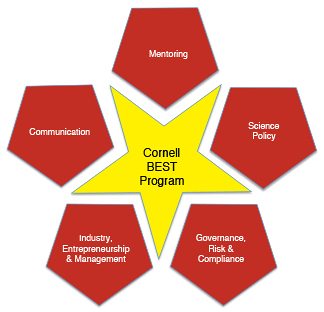BEST program gives Ph.D.s insights into nonacademic jobs
By Merry R. Buckley and Ashley N. Campbell

About 100 Cornell Ph.D. students and postdocs curious about jobs outside the academic world have enrolled so far in Broadening Experiences in Scientific Training (BEST), a National Institutes of Health-funded program that offers career resources, workshops and mentor-matching services to any science, technology, engineering and mathematics Ph.D. student or postdoc interested in careers in science policy, industry, business, science communication or government.
The program also enables hands-on opportunities for participants to explore their career options.
“A minority of Ph.D.s in the life sciences will end up in academia,” says BEST program director Susi Varvayanis. “What happens to everyone else? What about training for the other careers?”
Originally intended to serve only 30 individuals, Varvayanis says funding from the Graduate School, Colleges of Agriculture and Life Sciences, Engineering, Arts and Sciences, and Human Ecology has enabled BEST to provide services and support to all Cornell STEM doctoral students and postdocs who enroll.
The new BEST program website offers an expanded range of information and links to an online survey and application form. The website is designed to address the questions and needs of participants. It also includes information for faculty, who may want to know about demands the program may place on students’ time, says Varvayanis, who says the program is flexible and might entail anything from an hour or two a semester to an intensive full-time rotation or internship, with the faculty member’s consent.
Avery August, professor of immunology in the College of Veterinary Medicine, takes over the helm as principal investigator on the BEST grant from Joel Baines, who has accepted a position as dean of the School of Veterinary Medicine at Louisiana State University.
Before he was affiliated with the BEST program, August served on the NIH panel that judged BEST proposals from institutions all over the country. Many BEST proposals included one or two career avenues, such as biotechnology and business, says August, and the Cornell program is unique for the breadth and depth of the career areas it offers participants to explore.
“I’m excited to have the opportunity to help with providing these experiences,” says August. He points to BEST internship opportunities (called BESTernships), which, he says, may lead to collaborations between Cornell and area businesses, and to BEST workshops that offer hands-on career skills training and the chance to enhance Ph.D.’s science communications abilities.
Varvayanis and August agree that academia does not always do a good job at showing what it’s like to work in these other fields, but the services and resources available through BEST can benefit people with many types of career interests.
Merry R. Buckley is the education and outreach program coordinator for the Baker Institute for Animal Health and a BEST program mentor. Ashley N. Campbell is a Ph.D. student in the field of microbiology and a BEST program participant.
Media Contact
Get Cornell news delivered right to your inbox.
Subscribe